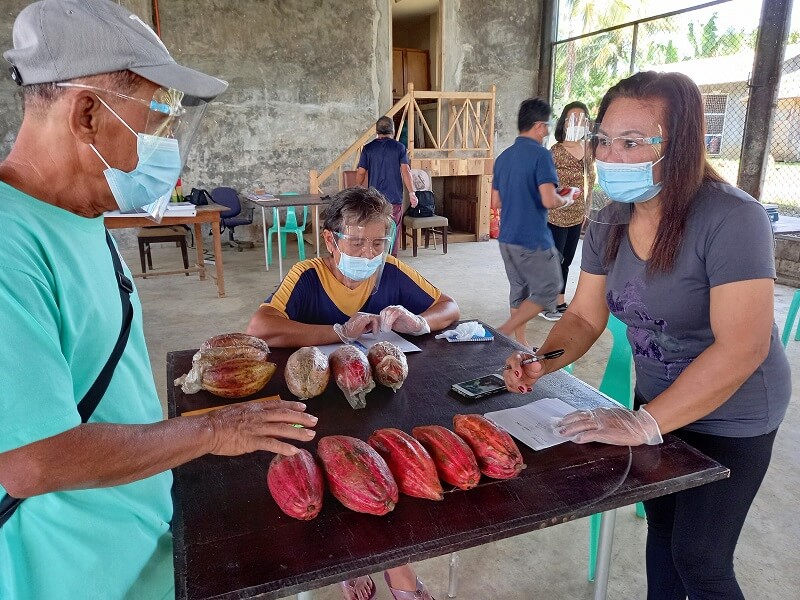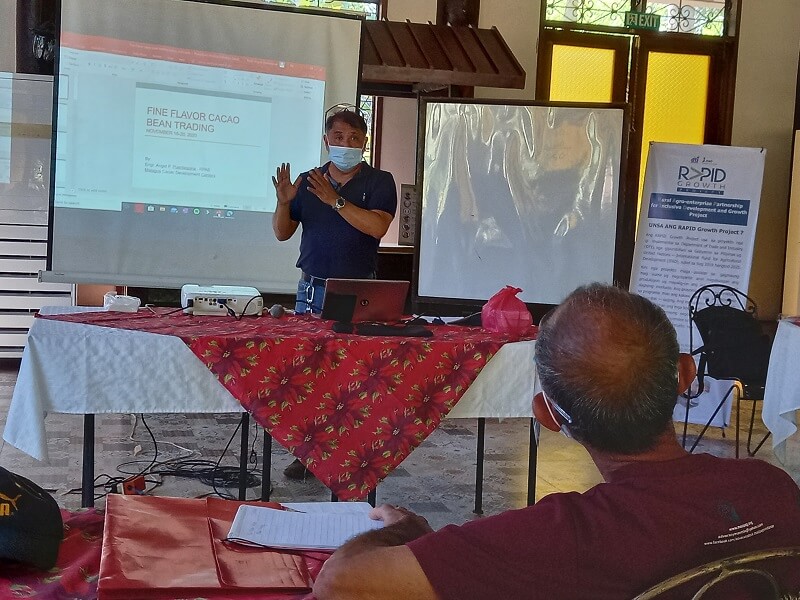
DAVAO CITY – The Department of Trade and Industry (DTI) Rural Agro-enterprise Partnership for Inclusive Development and Growth (RAPID Growth) Project, in partnership with the Puentespina Farms, conducted a five-day intensive training on cacao processing, bean trading, and cacao economics among the seven cacao farmer organizations from Davao Oriental on 16-20 November.
The Puentespina Farms, through its Malagos Cacao Development Center (MCDC), which is the birthplace of the award-winning Malagos Chocolate, shared its processing technology, standards, and protocols that brought them to the world stage. The participants, composed of twelve farmers, underwent several activities to hone their skills further. These included those on understanding the Philippine cacao genetics and opportunities, productivity enhancement, fermentation and drying process, and bean grading and cacao economics such as product costing. Furthermore, the cacao farmers and coop leaders had an actual field demonstration on all the topics to ensure that they acquired the necessary knowledge and skills related to technology and the science behind cacao production and processing.
In the meantime, the participants also received an orientation on Good Agricultural Practices (GAP) and process requirements from the Department of Agriculture (DA) Regulatory Division, as part of the project’s package of assistance. Likewise, the Philippine Crop Insurance Corporation (PCIC) gave an orientation of its services, as well as, encouraged these farmers and micro, small and medium enterprises (MSMEs) to avail of the government’s subsidized insurance intervention.
The seven farmer organizations that participated in the latest activities were the Nagkahiusang Mag-uuma sa San Isidro (NAGMASID ARCO), Davao Oriental Coco & Cacao Development Coalition (DOCCIDeC), Limot Tribal Mandaya Coop (LIMTRIMCO), Gov. Generoso Cacao Farmers (GGCFA), Panikian Cacao Sustainable Farmers (PACSFA), NAKMACCO and Yagakauyon ng Kooperatiba ng San Ignacio (YAKOSI). They would cascade these learnings to their respective members. These groups are beneficiaries of DA’s Philippine Rural Development Program’s (PRDP) cacao post-harvest facilities. As such, the DTI-RAPID Growth Project complements the other government agencies’ interventions and harmonizes the support to ensure that the proposed business model will be carried out and sustained.
The MCDC shared the same vision with the DTI – RAPID Growth Project, which is to build and sustain a solid supply of raw materials. Thus, it commits to helping in the production of high-quality cacao beans, while strengthening the foundation of cacao farming. Along this line, the company will enter into a marketing agreement with the farmer organizations. Part of the said partnership is the continuous technical interventions of MCDC, particularly the Puentespina Farms. Being the anchor firm, it would help establish the business enterprise systems and protocols of the backward links. This partnership with MCDC is expected to benefit around 300 to 350 cacao farmers, by having an institutional market for high-quality beans.
Puentespina Farms owner Charita Puentespina encouraged the farmer leaders to share the knowledge they acquired with their members and to really nurture their most vital capital – the cacao variety in the Philippines.
“If there’s proper technology transfer, the farmers could get a premium price for their produce, since they are targeting to provide and offer fine cacao both to the local and international markets,” Puentespina said.
To achieve the collaboration’s objective, all parties agreed to continuously work together to finalize their commercial partnership agreement. This would include the operating systems and protocols and the roles and responsibilities of each of them to strengthen and sustain the partnership.
The DTI- RAPID Growth Project is a special initiative, which DTI implements with funding support from the International Fund for Agriculture Development (IFAD). It focuses on four industries – cacao, coffee, coconut, and processed fruits and nuts.♦


Date of Release: 24 November 2020



